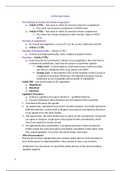Summary
Summary GDL EU Law Exam Revision Notes
- Course
- Institution
GDL EU Law Exam Revision Notes Comprehensive easy to follow revision notes that summarise the essential cases, treaty articles and persuasive authorities for each topic. Topics covered: EU Legislative Procedure, Direct Effect of Directives, Indirect and Incidental Effect of Directives, State Liabil...
[Show more]



